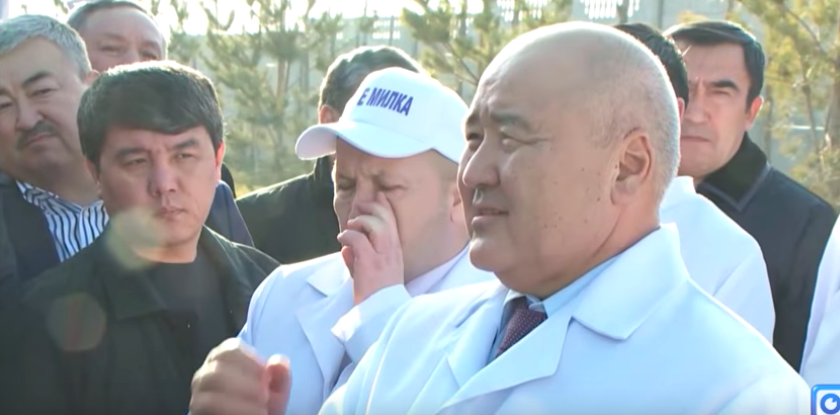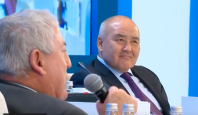It is unlikely that the “latifundists” will welcome Minister of Agriculture Umirzak Shukeyev’s idea to monitor the farm lands from space. Hence the serious conflicts between them and the officials are to be expected. Here is why.
In our recently published article “On the Prospects of the Agrobusiness and Shukeyev’s Plans”, we conclude that the new Minister of Agriculture and his team are foredoomed to –
- rely upon those Kazakhstan business-groups that feel competitive and possess the human, financial, industrial, lobbyist, and other resources for production increase, the domestic market takeover, and breaking into external markets;
- reform the state support system to stimulate the business-structures that have the potential to increase their own production and sales;
- cut the budget and credit resources expenditures for the support of the business-structures that are keeping afloat only thanks to the lobbyist power of their owners and management;
- break into the Chinese market;
- try and implement the four sub-programs that Umirzak Shukeyev formulated at the February 13, 2018 government meeting, namely, the implementation of the new precision technologies, the accelerated renewal of the agricultural machinery, the development of the animal production, the intensive development of irrigated lands.
However, Umirzak Shukeyev’s biggest problem lies in the fact that he is forced to navigate his way not in a vacuum but in a very tight, highly competitive and extremely aggressive environment that consists of the top and mid-level state officials, large and mid-size entrepreneurs, the respected civic activists, and influential technocrats. As a result, even the most effective, correctly formulated, scientifically supported and advanced reform programs are fated to be met with resistance on the part of the Kazakhstan ruling elite. This resistance is caused not only by the infringement on the interests of an influential group or figure but also because the reforms are being proposed by the “wrong” people who, in the case the reforms are successful, will strengthen their position in the state. Unfortunately, this scenario is unavoidable given Kazakhdtan’s current political system and practices.
All this means that Umirzak Shukeyev’s plans and intentions will be met with a serious resentment, first of all, on the part of the “latifundists”. This is how they usually call the people who, since the collapse of the USSR and the creation of the independent Kazakhstan, have received and kept the control over the large land masses, and not only those used for the agricultural purposes. To comprehend how powerful these people are, it is enough to recall that all Nursultan Nazarbayev’s attempts to put things right in Almaty and the Almaty region land management have failed.
It is precisely this social group usually consisting of former and acting officials of the top and middle ranks, their relatives, and the tightly connected entrepreneurs that today is in control of most farm lands in Kazakhstan. Note that they often conceal themselves behind nominal figures or management. For example, the “vitality” of Ivolga LLP can largely be explained by the fact that Nazarbayev’s nephew Akhmetzhan Esimov, one of the most influential Akorda’s persons who is currently acting as the Samrul-Kazyna National Welfare Fund Chairman, stood behind Vasiliy Rozinov. On the other hand, there are talks that he has been recently replaced by another close relative of Nazarbayev who has appointed his own man as the head of the business.
Meanwhile, Umirzak Shukeyev and his team are promoting the idea to monitor the farm lands from space. Politically speaking, however, this idea is dangerous for the “latifundists” since, having once established the facts of the lands misuse, the state agencies will first try to impose fees on the owners and renters and, second, expropriate the lands and return them to the state or give them to other users. Therefore, the unavoidable risks are growing: the real estate, unlike money, cannot be smuggled out of the country and hidden somewhere in the offshores.
This, in its turn, means that the stormy and serious conflicts between the officials and the “latifundists”, both in the legal field and in the lobbying field, lie ahead. The former will first insist on the state’s right to demand the purposeful use of the lands, second, they will undoubtedly try and insist on the effective use and, finally, on the careful use of the land. And, of course, they will be absolutely correct in their demands. Apart from that, after some time, the state will want to know all the names of the beneficial owners and the renters of the farm lands.
In our opinion, establishing the true to fact and publicly accessible record of the land use rights in Kazakhstan will become possible no earlier than in a decade. And then, the country’s agricultural sector will experience the same change that the banking sector had – it will finally become clear who the main beneficiaries of the state property privatization are.
It is unlikely that Umirzak Shukeyev who, though his relatives, can also be called a “latifundist” and is known for his cautiousness will risk an open confrontation with the practically entire Kazakhstan ruling elite. Therefore, the system of the distant monitoring of the farm lands will be established gradually and used with caution. On the other hand, as far as his other three sub-programs are concerned, Umirzak Shukeyev and his team will try and move forward as fast as they can. Simply because it is in their own private interests.
Of course, even in this case, they will be forced to go against the flow, but the number of their opponents will be significantly lower since many “latifundists” will be interested in the opening prospects. Besides, the other landowners, especially the small businesses, who consider the “latifundists” the proverbial “eye sores” are likely to support the state.
Generally speaking, even though Umirzak Shukeyev has little chance to achieve the strategic success, his chances to achieve the tactic success are high. He can easily strengthen his personal position in the state apparatus and significantly widen the sphere of his influence since the land (and not just the farm land) is one of today’s major elements of the ruling elite’s wealth and the person who can influence its redistribution is, undoubtedly, an influential figure himself.
However, Akorda and the government will not risk making the crucial step – to cardinally change the land taxing so the current owners and renters will be forced to switch to the modern growth and production technologies, to increase the labor productivity and the business effectiveness. For the authorities, it would be even more threatening than allowing foreign land ownership in Kazakhstan. The foreigners are not in the country yet whereas the current landowners have already settled down and would cut anyone’s throat to protect their property.





